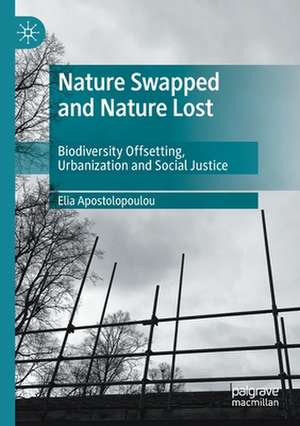Nature Swapped and Nature Lost: Biodiversity Offsetting, Urbanization and Social Justice
Autor Elia Apostolopoulouen Limba Engleză Paperback – 24 iun 2021
This book unravels the profound implications of biodiversity offsetting for nature-society relationships and its links to environmental and social inequality. Drawing on people’s resistance against its implementation in several urban and rural places across England, it explores how the production of equivalent natures, the core promise of offsetting, reframes socionatures both discursively and materially transforming places and livelihoods.
The book draws on theories and concepts from human geography, political ecology, and Marxist political economy, and aims to shift the trajectory of the current literature on the interplay between offsetting, urbanization and the neoliberal reconstruction of conservation and planning policies in the era following the 2008 financial crash. By shedding light on offsetting’s contested geographies, it offers a fundamental retheorization of offsetting capable of demonstrating how offsetting, and more broadly revanchist neoliberal policies, are increasingly used to support capitalist urban growth producing socially, environmentally and geographically uneven outcomes.
Nature Swapped and Nature Lost brings forward an understanding of environmental politics as class politics and sees environmental justice as inextricably linked to social justice. It effectively challenges the dystopia of offsetting’s ahistorical and asocial non-places and proposes a radically different pathway for gaining social control over the production of nature by linking struggles for the right to the city with struggles for the right to nature for all.
| Toate formatele și edițiile | Preț | Express |
|---|---|---|
| Paperback (1) | 1112.60 lei 6-8 săpt. | |
| Springer International Publishing – 24 iun 2021 | 1112.60 lei 6-8 săpt. | |
| Hardback (1) | 1116.26 lei 6-8 săpt. | |
| Springer International Publishing – 24 iun 2020 | 1116.26 lei 6-8 săpt. |
Preț: 1112.60 lei
Preț vechi: 1356.83 lei
-18% Nou
Puncte Express: 1669
Preț estimativ în valută:
212.96€ • 231.40$ • 179.00£
212.96€ • 231.40$ • 179.00£
Carte tipărită la comandă
Livrare economică 22 aprilie-06 mai
Preluare comenzi: 021 569.72.76
Specificații
ISBN-13: 9783030467906
ISBN-10: 3030467902
Pagini: 404
Ilustrații: XIX, 404 p. 11 illus., 2 illus. in color.
Dimensiuni: 148 x 210 mm
Greutate: 0.55 kg
Ediția:1st ed. 2020
Editura: Springer International Publishing
Colecția Palgrave Macmillan
Locul publicării:Cham, Switzerland
ISBN-10: 3030467902
Pagini: 404
Ilustrații: XIX, 404 p. 11 illus., 2 illus. in color.
Dimensiuni: 148 x 210 mm
Greutate: 0.55 kg
Ediția:1st ed. 2020
Editura: Springer International Publishing
Colecția Palgrave Macmillan
Locul publicării:Cham, Switzerland
Cuprins
Chapter 1. Introduction.- Chapter 2. Neoliberal Natures and Biodiversity Offsetting.- Chapter 3. Biodiversity Offsetting and Equivalent Natures.- Chapter 4. Value or Rent? A marxist analysis of Biodiversity Offsetting.- Chapter 5. Biodiversity offsetting and the restructuring of conservation in England: Deepening the neoliberal production of socionatures.- Chapter 6. Biodiversity Offsetting, urbanization and the neoliberalization of nature and space in post-crisis England.- Chapter 7: Discussing with the supporters and the opponents of biodiversity offsetting.- Chapter 8. Afterword.
Notă biografică
Elia Apostolopoulou is a senior research fellow at the University of Cambridge, UK and a visiting research fellow at Harokopio University of Athens, Greece. While writing a significant part of this book she was a lecturer at the Department of Geography, University of Cambridge, UK. She is also co-editor of The Right to Nature: Social Movements, Environmental Justice and Neoliberal Natures (2019).
Textul de pe ultima copertă
This book unravels the profound implications of biodiversity offsetting for nature-society relationships and its links to environmental and social inequality. Drawing on people’s resistance against its implementation in several urban and rural places across England, it explores how the production of equivalent natures, the core promise of offsetting, reframes socionatures both discursively and materially transforming places and livelihoods.
The book draws on theories and concepts from human geography, political ecology, and Marxist political economy, and aims to shift the trajectory of the current literature on the interplay between offsetting, urbanization and the neoliberal reconstruction of conservation and planning policies in the era following the 2008 financial crash. By shedding light on offsetting’s contested geographies, it offers a fundamental retheorization of offsetting capable of demonstrating how offsetting, and more broadly revanchist neoliberal policies, are increasingly used to support capitalist urban growth producing socially, environmentally and geographically uneven outcomes.
Nature Swapped and Nature Lost brings forward an understanding of environmental politics as class politics and sees environmental justice as inextricably linked to social justice. It effectively challenges the dystopia of offsetting’s ahistorical and asocial non-places and proposes a radically different pathway for gaining social control over the production of nature by linking struggles for the right to the city with struggles for the right to nature for all.
Elia Apostolopoulou is a senior research fellow at the University of Cambridge, UK and a visiting research fellow at Harokopio University of Athens, Greece. While writing a significant part of this book she was a lecturer at the Department of Geography, University of Cambridge, UK. She is also co-editor of The Right toNature: Social Movements, Environmental Justice and Neoliberal Natures(2019).
Caracteristici
Offers a theoretically-informed and socially rooted, radical critique of the interplay between offsetting, urbanization and the neoliberal reconstruction of conservation and planning policies Critically analyses social contestation and community struggles against biodiversity offsetting in England Draws attention to the way offsetting exacerbates inequality by producing socially, environmentally and geographically uneven outcomes
